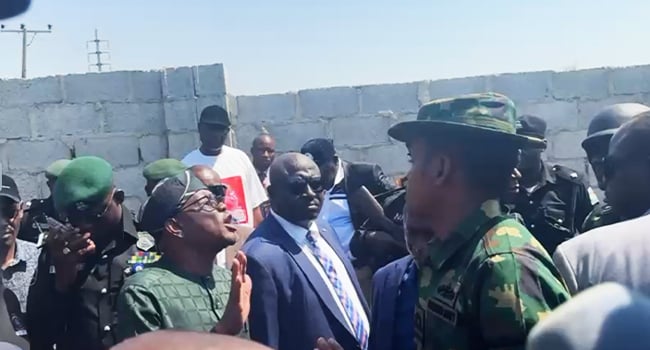In a bid to dispel growing speculation surrounding an alleged confrontation between the Federal Capital Territory Administration (FCTA) and the Nigerian military, the Minister of the Federal Capital Territory, Nyesom Wike, has firmly denied reports of any personal or institutional conflict. Speaking to journalists in Abuja, Wike clarified that his recent actions regarding disputed lands in the FCT were strictly guided by the rule of law and not by any form of animosity or power tussle.
No Rift, Only Enforcement of the Law
Wike, who has faced media scrutiny following reports of a supposed clash with the military over land ownership, described such narratives as “false, misleading, and sensational.” He emphasized that his administration holds the Nigerian military in the highest regard and has no reason to engage in confrontation with any security agency.
“There is no conflict between the FCT Administration and the Nigerian military. What we are simply doing is enforcing the law. Nobody, no matter their position or background, is above the law,”
— Wike stated emphatically.
According to the minister, the controversy stems from an incident involving a naval officer reportedly stationed on a disputed parcel of land in Abuja. The land, he explained, had been designated for agricultural purposes but was later converted to residential and commercial use without approval — a violation of the Abuja Master Plan.
Commitment to Restoring Order in Abuja
Since assuming office as FCT Minister, Nyesom Wike has made urban order and adherence to the Abuja Master Plan the cornerstone of his policy direction. He reiterated that under his leadership, the FCTA would not compromise on enforcing regulations that govern land use, development control, and environmental planning.
“The FCT is not a jungle. We cannot allow people to wake up and decide to build or occupy land without proper documentation. Abuja was designed with a master plan, and our duty is to restore that plan. That is what we are doing,”
— the minister stressed.
Wike’s declaration aligns with President Bola Tinubu’s renewed emphasis on restoring discipline, transparency, and accountability in the management of the Federal Capital Territory. The minister noted that the President had given him full support to sanitize Abuja and ensure that all developments conform to approved standards.
Respect for the Military, Not Confrontation
The minister took time to reaffirm his deep respect for the Nigerian Armed Forces, describing them as “institutions that deserve nothing but honor and cooperation.” He clarified that any issues involving land or military personnel would be resolved through institutional dialogue, not confrontation.
“The military is a respected institution. If there is any misunderstanding, it will be addressed through the right channels — the Chief of Defence Staff, the Service Chiefs, and relevant authorities. There is no reason for conflict,”
— Wike assured.
He further urged the public to ignore reports of a feud, stating that such misinformation was the result of unverified media stories designed to stir unnecessary controversy.
A Warning to Media Outlets: Verify Before Publishing
In a passionate appeal to journalists, Wike cautioned against the spread of unverified news, which, he said, could undermine public confidence and damage institutional relationships. He reminded the media of their constitutional duty to promote truth and accountability, not sensationalism.
“I have no problem with the media doing their work, but it must be done responsibly. Verify information before publishing. Don’t create tension where there is none,”
— he advised.
Observers note that the minister’s caution reflects a growing concern among public officials about the rise of misinformation in the digital age, particularly regarding sensitive issues like land ownership, security, and governance.
Land Use Violations and the Abuja Master Plan
Wike’s renewed enforcement drive has put many high-profile individuals and organizations on alert. The FCTA recently embarked on a series of demolition and recovery operations, targeting illegal structures and properties that violated zoning laws or encroached on public spaces.
The minister emphasized that the government was not targeting any particular group but was committed to upholding the integrity of Abuja’s development plan — a plan that has been repeatedly distorted over the years by illegal land allocations and unauthorized conversions.
“If you have land for agriculture, use it for agriculture. Don’t turn it into a housing estate or shopping complex. If you must change the purpose, get proper approval. That is what the law says,”
— Wike maintained.
Public Reactions and Political Context
Reactions to Wike’s stance have been mixed. Supporters commend his boldness and zero-tolerance for illegality, describing his leadership style as a necessary corrective measure to years of administrative negligence in the FCT. Critics, however, argue that the minister’s approach could be perceived as heavy-handed if not balanced with transparency and due process.
Political analysts note that this incident is another test of Wike’s administrative style — one characterized by firmness, speed, and visible results, often drawing both praise and controversy. His insistence on following the law without exceptions may reshape Abuja’s governance landscape, especially if sustained over time.



